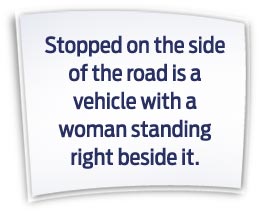
Providence. Some words are better understood in action than by mere definition.
• • •
I did not recognize the name.
There, in my inbox, was an e-mail from “Elaine Hardy” with the subject line: Re: AR Column. The e-mail skips polite introduction and quickly gets to the point: “It is difficult to see how you can find the positive in our daily lives,” wrote Elaine. “I want to believe that what you see is tangible; I find there is no good left. . . . I have prayed about the callousness in my heart and felt compelled to contact you.” A member of my church, she urged me to contact the pastor to confirm the genuine nature of her message. How can I not recognize her name?
Two days later I am meeting my friend Tori for breakfast to celebrate her birthday. Even with a beautiful day calling me, I find I cannot leave the house without skimming through Elaine’s e-mail again. I wonder where she lives. There’s such honesty in her request: “Would you consider spending some time with this old lady and pointing out what is not ‘obvious’? Can you help me ‘search’ and share something new with an old soul?”
 During breakfast, as I share details of Elaine’s e-mail with Tori, it dawns on me this is the first instance that somebody has asked for my time. My time is often taken or given to students, colleagues, family, and friends on a daily basis. Why am I having a difficult time considering her request to meet? Tori listens and says: “You never include your e-mail in the column. She searched for you. Call her.”
During breakfast, as I share details of Elaine’s e-mail with Tori, it dawns on me this is the first instance that somebody has asked for my time. My time is often taken or given to students, colleagues, family, and friends on a daily basis. Why am I having a difficult time considering her request to meet? Tori listens and says: “You never include your e-mail in the column. She searched for you. Call her.”
I do. Just like that.
I dial the familiar phone number I have seen in the e-mail so many times. My call is answered by voicemail. I leave a brief message for Elaine. It is officially out of my hands. Shortly after, Tori and I begin the trek home. Traffic is heavier, and our conversation stops abruptly as we notice a dangerous scene ahead. Stopped on the side of the road is a vehicle with a woman standing right beside it. What is she doing? This is probably the worst place to stop! There are no safe shoulders for stopping on this road!
We take in the scene quickly, noticing that the woman is entirely alone by the side of the road. She is inspecting her vehicle. We cannot drive past her! Instinctively I pull up right in front of her vehicle, carefully exit, and walk toward her. Above the noise of traffic I hear the elderly woman thank us for stopping. She is on her way to visit her daughter and unfortunately ran over some rubble on the road. She points at the flat tire, looks at her surroundings, and shows us her empty hands: “I left the house without my purse, and I don’t have my cell phone to call my daughter or a tow truck. How could I forget my purse?”
As we all get into my vehicle, I offer to drive her to a safer location and quickly hand over my cell phone so that she can call her daughter. I am anxious to get us back on the road. The daughter answers the phone, and the elderly woman’s voice breaks. She’s crying. Sitting next to me, hands trembling, she’s scared. Tori reaches for the phone and talks to the daughter as I slowly merge back into traffic. We will meet at the gas station five miles up the road. Tori shares with her the details of our morning birthday celebration. I hope this will calm her down. I pull into the gas station. The daughter must not be here yet. We wait for a few minutes.
My cell phone rings. A vaguely familiar voice says: “This is Tiffany Hardy. My mother, Elaine Hardy, is with you?” I glance at the elderly woman, sorrowfully looking out the window. Providence? Confirming our location for her daughter, I reach over and take Elaine’s hand. For the first time since our encounter, she looks me in the eye. Slowly a smile lights up her face as she says: “This old soul is no longer a skeptic.” Providence.
Neither am I.
_________
Dixil Rodríguez, a university professor and volunteer chaplain, lives in north Texas. Join the dialogue at [email protected]. This article was published October 11, 2012.